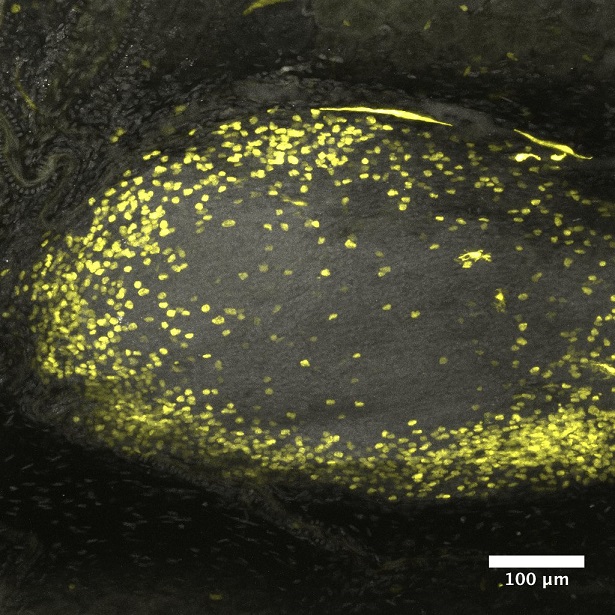
D. Brent Polk, MD, AGAF, an investigator at Children’s Hospital Los Angeles, has been awarded $1.5 million by the National Institute of Diabetes and Digestive and Kidney Diseases of the NIH for the study of tumor necrosis factor (TNF) and its role in inflammatory bowel disease (IBD). The new research seeks to reveal important information about the cellular and molecular activity that triggers IBD and may point to new treatment approaches for patients.
IBD, which includes Crohn’s disease and ulcerative colitis, is a chronic inflammatory disorder of the gastrointestinal tract. IBD affects as many as 1.6 million people in the United States and a fifth of those patients are children. While the exact causes of IBD are unknown, they cause inflammation that affects the lining of the digestive tract.
Tumor necrosis factor (TNF) is a cell signaling protein secreted by immune and other cells that affects cellular activity and controls inflammation and has been found to play a central role in the disease process of IBD. While anti-TNF therapies are part of the medical treatment regimen for many IBD patients, in the majority it is not an effective treatment in the long term. Many patients treated with anti-TNF biologics either do not respond or lose response within a year.
“Our goal is to better understand the cellular activity behind the mechanisms that drive injury or impair the normal repair responses to develop more precise treatment options for patients with IBD,” said Polk, a pediatric gastroenterologist and principal investigator of the study.
In a previous study, Polk’s research team demonstrated that despite TNF’s reputation for promoting inflammation, it can have beneficial and protective effects on the intestine, as well. The molecule TNF, which is part of a major signaling center in the body, actually has two different receptors, TNFR1 and TNFR2, which can be targeted to promote or reduce inflammation. The team established that TNFR2 drives a specific pathway that restricts inflammation.
The investigators are now working to understand exactly how TNFR2 acts to reduce inflammation by looking at its activity within immune cells to restrict their ability to promote intestinal inflammation. They will also look at how TNFR2 operates in the stem cells of the intestine to discover ways to change its activity to get stem cells to multiply or be more responsive to the wounds in individuals with IBD in order to repair intestinal injury.
“By looking at how TNFR2 functions in both immune cells and in intestinal stem cells to reduce inflammation, we may be able to design new therapies that mimic the way the body does this naturally, and promote better health outcomes for our patients through a new precision medicine pathway” added Polk, who is also a professor of pediatrics and biochemistry and molecular medicine at the Keck School of Medicine of USC.
